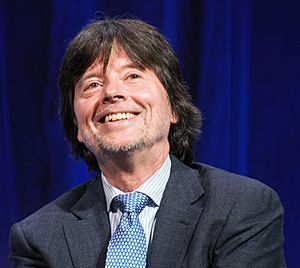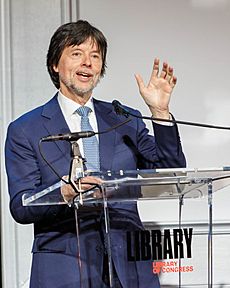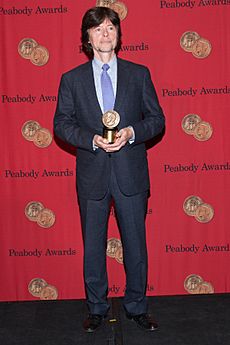Ken Burns facts for kids
Quick facts for kids
Ken Burns
|
|
|---|---|

Burns in 2018
|
|
| Born |
Kenneth Lauren Burns
July 29, 1953 Brooklyn, New York, U.S.
|
| Alma mater | Hampshire College (BA) |
| Occupation | Filmmaker |
| Years active | 1970–present |
|
Notable work
|
|
| Spouse(s) |
|
| Children | 4, including Sarah and Lilly Burns |
| Relatives | Ric Burns (brother) |
Kenneth Lauren Burns (born July 29, 1953) is a famous American filmmaker. He is well-known for his documentary movies and TV shows. Many of his works tell stories about American history and culture. His films are often shown on PBS, a public television network. Ken Burns lives in a small town called Walpole, New Hampshire.
Some of his most popular documentary series include The Civil War (1990), Baseball (1994), Jazz (2001), and The National Parks: America's Best Idea (2009). He also made The Vietnam War (2017) and Country Music (2019). His documentaries have won many awards, including Emmy Awards.
Contents
Ken Burns's Early Life and Education
Ken Burns was born on July 29, 1953, in Brooklyn, New York. His mother was Lyla Smith Burns, and his father was Robert Kyle Burns Jr. Ken has a younger brother named Ric Burns, who is also a documentary filmmaker.
His family moved often when he was growing up. They lived in places like France, Delaware, and Michigan. Ken's mother passed away when he was 11 years old. He later said that this experience made him want to bring stories of people from the past back to life. As a child, he loved reading the family encyclopedia, especially history books.
When Ken was 17, he received an 8 mm film camera for his birthday. He used it to make a short documentary about a factory. After finishing high school in 1971, he went to Hampshire College in Massachusetts. There, he studied film and design. He worked in a record store to help pay for his college. He graduated in 1975 with a degree in film studies.
Florentine Films Production Company
In 1976, Ken Burns and two college friends, Elaine Mayes and Roger Sherman, started a film company. They called it Florentine Films. It is located in Walpole, New Hampshire. Another friend, Buddy Squires, joined them later.
Each filmmaker at Florentine Films works on their own projects. However, they all release their films under the Florentine Films name. Ken Burns's oldest daughter, Sarah, also works for the company.
Ken Burns's Filmmaking Career

Ken Burns started his career as a cinematographer, which means he operated cameras for films. In 1977, he began working on a documentary about the Brooklyn Bridge. He developed a special style of filmmaking. He would use old still pictures and slowly zoom in or pan across them. He would also add narration from old writings, read by famous actors. This style made his films feel alive.
His film Brooklyn Bridge (1981) was nominated for an Academy Award. It was shown on PBS. He was also nominated for an Oscar for The Statue of Liberty (1985). Ken Burns often works with historian Geoffrey C. Ward on his films.
Burns has had a very successful career making many TV documentaries and series. His films cover many different topics:
- Art: Thomas Hart Benton (1988)
- Media: Empire of the Air: The Men Who Made Radio (1991)
- Sports: Baseball (1994)
- History: Thomas Jefferson (1997)
- Music: Jazz (2001) and Country Music (2019)
- Literature: Mark Twain (2001) and Hemingway (2021)
- Environment: The National Parks (2009)
- War: The War (2007) about World War II, and The Civil War (1990). Many people think The Civil War is his best work.
Ken Burns has plans to make documentaries for many years to come. Some of his future topics include the American Revolution, Muhammad Ali, and Benjamin Franklin. In April 2025, he released a two-part documentary about Leonardo da Vinci. This was a rare film for him, as it focused on a non-American topic.
Ken Burns's Personal Life
In 1979, Ken Burns moved from New York City to Walpole, New Hampshire. He said that moving to a small town helped him become successful.
In 1982, he married Amy Stechler. They had two daughters, Sarah and Lilly. They divorced in 1993.
In 2003, Ken Burns married Julie Deborah Brown. They also have two daughters. Julie Deborah Brown started a non-profit group called Room to Grow, which helps babies in families who need support.
Ken Burns is related to an old American family and also to the Scottish poet Robert Burns. He enjoys collecting quilts. Some of his quilts were shown in a museum in 2018.
He has said that all his films are, in a way, about his mother. He also loves doing the New York Times crossword puzzle every day.
Political Views
Ken Burns supports the Democratic Party. He has made videos for political events, like a tribute to Senator Ted Kennedy in 2008. He also supported Barack Obama for president in 2007. In 2016, he gave a speech at Stanford University where he criticized Donald Trump.
Awards and Honors for Ken Burns

Ken Burns has won many awards for his films. These include two Oscar nominations, two Grammy Awards, and 15 Emmy Awards.
Some of his awards include:
- 1982 nomination, Academy Award for Documentary Feature: Brooklyn Bridge (1981)
- 1986 nomination, Academy Award for Documentary Feature: The Statue of Liberty (1985)
- 1995 Emmy Award for Outstanding Informational Series: Baseball (1994)
- 2010 Emmy Award for Outstanding Non-fiction Series: The National Parks: America's Best Idea (2009)
His film The Civil War won over 40 major film and TV awards. These included two Emmy Awards, two Grammy Awards, and a Peabody Award. In 1991, he received the National Humanities Medal. He also received a Lifetime Achievement Award from the Academy of Television Arts & Sciences in 2008.
In 2010, he was honored for helping people understand National Parks. In 2012, he received the Washington University International Humanities Medal. He was also the Grand Marshal for the Rose Parade in 2016.
Ken Burns's Filmmaking Style
Ken Burns often uses simple music in his films. For example, The Civil War features a special violin melody called "Ashokan Farewell". This music helps set the mood for the film.
He is also famous for how he uses still photographs. He slowly zooms in on parts of a picture or pans across it. This makes the old photos feel like they are moving. This technique is so well-known that it is called the "Ken Burns effect" in some computer software like Apple's iPhoto and iMovie.
Ken Burns has said that he usually does not allow his name to be used for commercial products. However, Steve Jobs, the head of Apple, convinced him by offering Apple equipment. Ken Burns then donated this equipment to non-profit groups.
His films are different from many fast-paced TV shows today. He uses older techniques but puts them together in a new and complex way. He has said that he is influenced by filmmaker Errol Morris.
Ken Burns's Filmography
Here is a list of some of the films Ken Burns has directed or produced:
Documentary Films and Series
- Brooklyn Bridge (1981)
- The Shakers: Hands to Work, Hearts to God (1984)
- The Statue of Liberty (1985)
- Huey Long (1985)
- Thomas Hart Benton (1988)
- The Congress (1988)
- The Civil War (1990; 9 episodes)
- Empire of the Air: The Men Who Made Radio (1992)
- Baseball (1994; 9 episodes – updated with The Tenth Inning in 2010)
- Thomas Jefferson (1997; 2 episodes)
- Lewis & Clark: The Journey of the Corps of Discovery (1997)
- Frank Lloyd Wright (1998)
- Not for Ourselves Alone: The Story of Elizabeth Cady Stanton & Susan B. Anthony (1999)
- Jazz (2001; 10 episodes)
- Mark Twain (2002)
- Horatio's Drive: America's First Road Trip (2003)
- Unforgivable Blackness: The Rise and Fall of Jack Johnson (2005; 2 episodes)
- The War (2007; 7 episodes)
- The National Parks: America's Best Idea (2009; 6 episodes)
- Prohibition (2011; 3 episodes)
- The Dust Bowl (2012; 2 episodes)
- The Central Park Five (2012)
- Yosemite: A Gathering of Spirit (2013)
- The Address (2014)
- The Roosevelts: An Intimate History (2014; 7 episodes)
- Jackie Robinson (2016; 2 episodes)
- Defying the Nazis: The Sharps' War (2016)
- The Vietnam War (2017; 10 episodes)
- The Mayo Clinic: Faith – Hope – Science (2018)
- Country Music (2019; 8 episodes)
- Hemingway (2021; 3 episodes)
- Muhammad Ali (2021; 4 episodes)
- Benjamin Franklin (2022; 2 episodes)
- The U.S. and the Holocaust (2022; 3 episodes)
- The American Buffalo (2023; 2 episodes)
- Leonardo da Vinci (2024; 2 episodes)
Future Releases
- The American Revolution (November 2025)
- Henry David Thoreau (2026, as Executive Producer)
- Emancipation to Exodus (2027)
- LBJ & the Great Society (2028)
Short Films
- William Segal (1992)
- Vezelay (1996)
- In the Marketplace (2000)
As an Executive Producer
- The West (1996)
- Cancer: The Emperor of All Maladies (2015)
- Walden (short, 2017)
- Country Music: Live at the Ryman, a Concert Celebrating the Film by Ken Burns (2019)
- College Behind Bars (2019)
- East Lake Meadows: A Public Housing Story (2020)
- The Gene: An Intimate History (2020)
- Hiding in Plain Sight: Youth Mental Illness (2022)
As an Actor
Ken Burns has also appeared as himself in some TV shows and movies:
- Gettysburg (film; 1993)
- Clifford's Puppy Days (2005)
- The Simpsons (several episodes from 2003 to 2023)
- The Mindy Project (2014)
- Difficult People (2016)
See also
 In Spanish: Ken Burns para niños
In Spanish: Ken Burns para niños
 | Shirley Ann Jackson |
 | Garett Morgan |
 | J. Ernest Wilkins Jr. |
 | Elijah McCoy |

